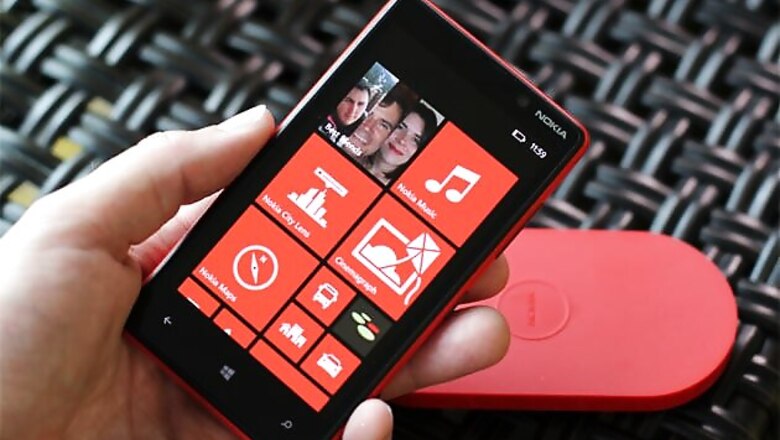
views
Helsinki: Nokia shares plummeted 13 per cent after its new Lumia smartphones failed to impress investors looking for transformational handsets to rescue the struggling Finnish company.
Nokia and its partner Microsoft Corp showcased the Lumia 920 phone on Wednesday in what may be their last major shot at reclaiming market share lost to Apple Inc, Samsung Electronics Co Ltd and Google Inc.
Microsoft and Nokia hope the device - sporting bright colors, a bigger screen and technology that reduces blur and shakiness in pictures and video - will become a potent weapon in an escalating global war to dominate the mobile industry. But investors said it lacked "wow" and gave it a quick thumbs-down. Some analysts said Nokia's reticence about dates, prices or carrier partners also did not help.
Nokia shares traded in Helsinki began sliding midway through the New York launch and ended down 13 per cent at 1.99 euros, their biggest single-day loss since June. Nokia's U.S.-listed stock closed down nearly 16 percent at $2.38. The stock had gained 67 percent since mid-July as anticipation built ahead of the Lumia's unveiling.
The Lumia was the first in a flurry of planned mobile-device launches expected ahead of the holiday shopping season. Google's Motorola Mobility showed off three new smartphones based on Android software later on Wednesday. Verizon Wireless the top U.S. mobile provider committed to sell all three of the Motorola phones.
Amazon.com Inc will unwrap its new Kindle Fire tablets on Thursday and Apple is expected to unveil the latest version of its seminal iPhone on September 12.
"The challenge is that the world is working on the 4th, 5th and 6th editions of their devices, while Nokia is still trying to move from chapter 1. It still has quite a bit to catch up," said RBC analyst Mark Sue.
"People were looking for something that would dazzle. Most investors will view it as evolutionary, not revolutionary. Nokia has made some good progress, but investors were looking for quantum leaps. We didn't get that."
Many of the industry analysts who saw the phone up close in New York deemed it a solid device with a few differentiating features. But it did not push the envelope as Nokia CEO Stephen Elop had promised.
The device runs on the latest Windows Phone operating system, which Microsoft - the world's largest software maker - hopes will rival Apple's iOS and Google's Android to become a third mobile platform.
Nokia announced no partnerships with wireless service providers, leading some analysts to worry this was a sign of weak carrier support. The Finnish handset maker said it would announce pricing and roll-out dates for the new Lumia later on a country-by-country basis.
"It is impossible to assess this launch without price and roll-out info. This is disappointing," said Bengt Nordstrom, CEO of telecommunications consultancy Northstream.
For Microsoft, successful Lumia sales could convince more handset makers and carriers to support Windows Phone 8, which promises faster performance and a customizable start screen. Samsung last week became the first to announce a smartphone running that software, which it said it would begin selling as early as next month.
If the new phones do not appeal to consumers, it could spell the end for money-losing Nokia and deal a serious blow to Microsoft in its attempts to regain its footing in the market.
"We're working with our carrier partners to finalize our plans," said Jo Harlow, executive vice president of smart devices for Nokia.
Windows phones have captured only 3.7 percent of the global smartphone market, according to Strategy Analytics.
Asked about estimates that Windows phones might account for 10 percent of the market by the end of 2013, Harlow said: "With momentum, if we're at 10 percent at the end of 2013, I'd be a happy girl."
Ecosystem warriors
Nokia badly needs a hit. It has logged more than 3 billion euros ($3.8 billion) in operating losses in the past 18 months, forcing it to cut 10,000 jobs. Its share of the global smartphone market has plunged to less than 10 percent from 50 percent during its heyday, before the iPhone arrived in 2007.
The Lumia 920 - billed as the flagship Windows phone - uses "PureView" and floating-lens technology for its 8.7 megapixel camera to reduce blurring and shakiness from hand motion, and has wireless charging capability.
Powered by Qualcomm Inc's Snapdragon processor, it comes with augmented reality technology that lets users see details of their surroundings through the camera. And it sports a bigger, brighter, 4.5-inch screen than Nokia's previous smartphones, taking a page from rivals such as Samsung, which has backed larger displays.
Attendees at the New York event did not see the Lumia as a significant threat to the iPhone, the device that revolutionized the mobile industry and popularized the model of a third-party developer "ecosystem," today considered pivotal to the success of any operating system.
Part of the reason for the limited success of Windows phones is that they support only 100,000 or so apps, compared with about 500,000 or more for Android or iPhones.
Apple's and Google's entrenched positions - where consumers have already invested heavily in apps and content - discourages switching to a new mobile system.
Windows Phone 8, however, might have several factors in its favor. It is similar to the Windows 8 desktop and tablet software to be released October 26, making it easier for developers to write apps for both. Microsoft hopes this will boost the platform's popularity.
"The big difference versus Android is that there is a big Microsoft developer base that will catch on quicker, once there is a sufficient customer base," said Magnus Jern, founder and chief executive of Barcelona-based Golden Gekko, which has created Windows Phone apps for Heathrow Airport and for Yellow Pages in many European countries.
Many developers already working on iOS and Android may look to support Windows via HTML5 - a Web programming standard intended to work across different mobile platforms - to avoid having to fund a third or fourth development team.
"HTML5 apps require less skilled resources to achieve a minimum level of service. And although it's a compromise, it works and is usually an acceptable compromise," Jern said.
The new Lumias could also benefit from the continuing decline in Research In Motion Ltd's BlackBerry and from a recent legal setback for the Android operating system.
A California jury decided last month that some of Samsung's hot-selling Android smartphones copied features from the iPhone, which might result in import bans and drive handset makers to put more resources into making Windows-based phones.
But for Nokia and Microsoft to exploit that window of opportunity, they must first win over consumers, who so far have shown little enthusiasm for Windows smartphones.
"If you were looking for an iPhone knock-out punch, this isn't it. That's not going to happen with one product," said Ross Rubin, an analyst at Recticle Research.



















Comments
0 comment